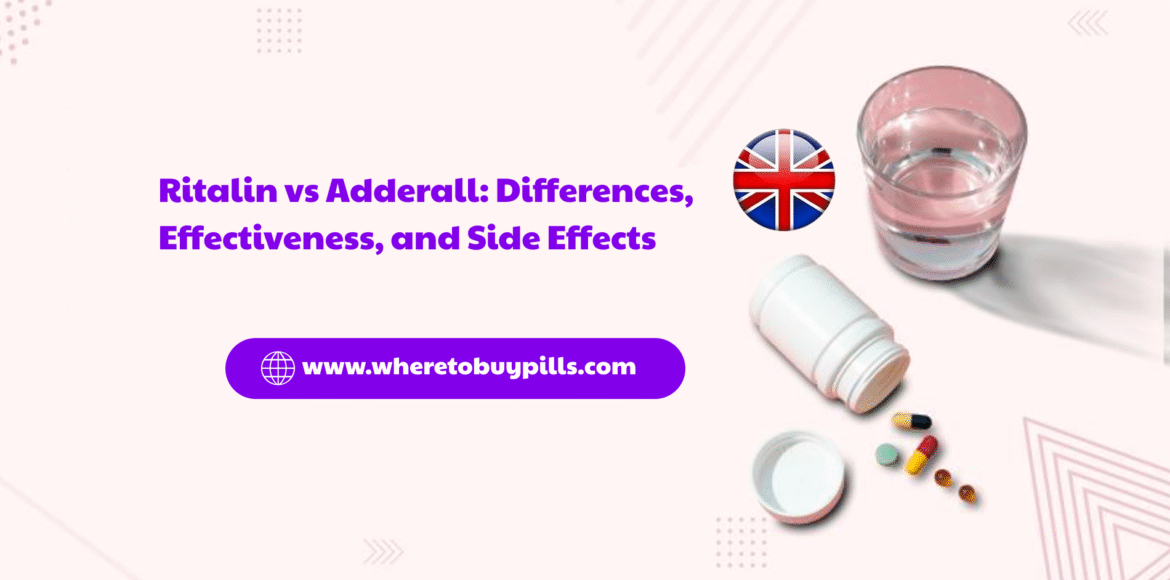Ritalin vs Adderall: Differences, Effectiveness, and Side Effects Buy Adderall Online
Both Ritalin and Adderall are prescription stimulants commonly used to treat Attention Deficit Hyperactivity Disorder (ADHD) and narcolepsy. Though they share similar goals — improving focus, attention, and impulse control — they differ in chemical composition, duration, side effects, and how they work in the brain.
If you or someone you know is considering ADHD treatment, understanding the key differences between Ritalin vs Adderall can help make an informed, safe choice.
Overview: What Are Ritalin and Adderall?
Ritalin (generic name: methylphenidate) and Adderall (a mix of amphetamine and dextroamphetamine) are both central nervous system stimulants, but they act on different neurotransmitters and metabolize differently.
| Medication | Active Ingredient | Drug Class | Common Forms |
|---|---|---|---|
| Ritalin | Methylphenidate | Stimulant | Immediate Release (IR), Extended Release (ER) |
| Adderall | Amphetamine/Dextroamphetamine | Stimulant | Immediate Release (IR), Extended Release (XR) |
Both medications increase dopamine and norepinephrine activity in the brain, which enhances alertness and concentration — key challenges for individuals with ADHD.
How Ritalin vs Adderall Work in the Brain
-
Ritalin works by blocking the reuptake of dopamine and norepinephrine, allowing these neurotransmitters to stay active longer in the brain.
-
Adderall, on the other hand, stimulates the release of these neurotransmitters while also slowing their reuptake.
Because of this, Adderall tends to have a stronger and longer-lasting effect for many people, while Ritalin acts faster but fades sooner.
Onset and Duration of Action
| Medication | Onset (Time to Work) | Duration (Effect Lasts) |
|---|---|---|
| Ritalin (IR) | 20–30 minutes | 3–4 hours |
| Ritalin (ER) | 30–45 minutes | 6–8 hours |
| Adderall (IR) | 30–60 minutes | 4–6 hours |
| Adderall (XR) | 30–60 minutes | 10–12 hours |
Ritalin acts faster but wears off sooner, making it suitable for people who prefer shorter, controllable dosing windows.
Adderall, in contrast, offers longer-lasting symptom control — ideal for school or work days.
Effectiveness: Which Works Better for ADHD?
Both drugs are effective for ADHD, but their effectiveness can vary depending on individual brain chemistry, metabolism, and lifestyle.
-
Ritalin tends to be more effective for younger children, as their metabolism processes methylphenidate efficiently.
-
Adderall often provides better symptom control for adolescents and adults, due to its longer duration and balanced stimulant profile.
Clinical studies show that both medications improve attention and reduce hyperactivity, though some people respond better to one than the other.
Finding the right fit often requires trial and adjustment under medical supervision.
Side Effects: Ritalin vs Adderall
Both medications share many side effects due to their stimulant nature, but the intensity and frequency can differ.
Common Side Effects
-
Loss of appetite
-
Insomnia
-
Dry mouth
-
Nervousness or anxiety
-
Increased heart rate
-
Headache or stomach pain
Differences in Side Effects
-
Ritalin may cause more irritability or mood swings when it wears off.
-
Adderall can cause stronger appetite suppression and longer sleep disturbances due to its extended action.
Both medications can also lead to tolerance or dependence if misused.
Cost and Availability
Both drugs are available as generic formulations, but Ritalin generics (methylphenidate) are often slightly cheaper than Adderall generics (amphetamine salts).
Insurance coverage typically includes both, though availability may vary by pharmacy or region.
Can You Switch Between Ritalin and Adderall?
Yes — but only under medical supervision.
Because the two drugs differ in chemical structure and potency, direct substitution is not recommended without dosage adjustment. Your doctor will usually start with a low dose and gradually increase it to find the optimal effect.
Which Is Safer — Ritalin vs Adderall?
Both medications are considered safe when taken as prescribed. However:
-
Ritalin has a shorter duration, meaning it leaves your body faster — potentially reducing side effects and risk of insomnia.
-
Adderall’s longer half-life can be beneficial for sustained attention but increases the chance of appetite loss or sleeplessness.
People with heart issues, anxiety disorders, or a history of substance misuse should discuss alternatives with their doctor.
FAQ: Ritalin vs Adderall
1. Which is stronger, Ritalin vs Adderall?
Adderall is generally stronger and lasts longer than Ritalin, but Ritalin acts faster. The best choice depends on your individual needs.
2. Can Ritalin and Adderall be taken together?
No. Combining stimulants can increase the risk of heart problems, anxiety, and overstimulation. Only take one medication as prescribed.
3. Which has more side effects, Ritalin vs Adderall?
Both can cause appetite loss, insomnia, and anxiety. Adderall tends to have more prolonged effects, while Ritalin can cause sharper “crashes.”
4. Is Ritalin or Adderall better for adults?
Adderall often works better for adults needing longer coverage, while Ritalin may suit children or those sensitive to stimulants.
5. Can you fail a drug test on Ritalin or Adderall?
Yes. Both can trigger positive results for amphetamines. Always disclose your prescription before testing.
Final Thoughts
The choice between Ritalin vs Adderall depends on personal health, symptom patterns, and lifestyle needs.
Ritalin offers faster relief and flexible dosing, while Adderall provides longer-lasting concentration and focus.
Always work closely with a healthcare provider to find the right medication, dosage, and schedule for your ADHD management plan.


